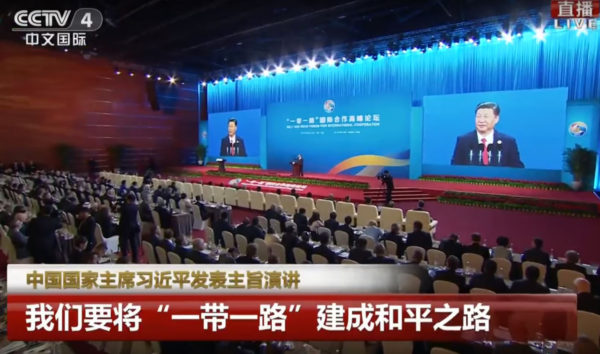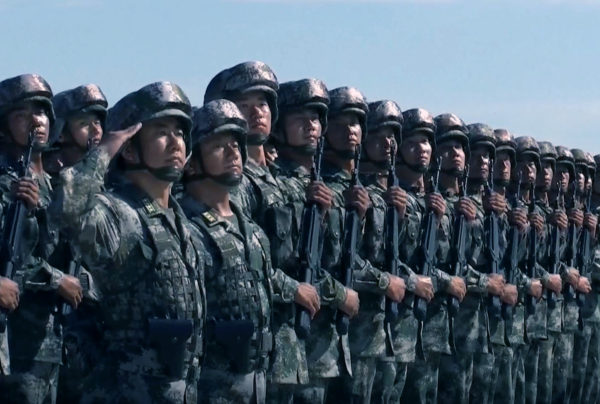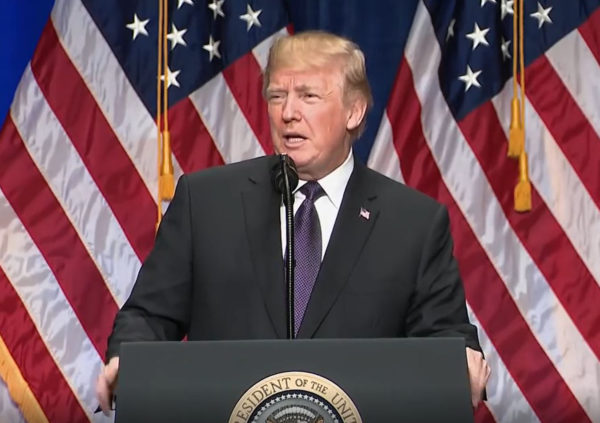◎ Trump’s NSS correctly identifies the challenge posed by “competitor” China to America’s domestic security and global influence.
By Don Tse and Larry Ong
China is a “rival power” that seeks “to challenge American influence, values, and wealth,” said United States President Donald Trump in a speech introducing his national security strategy (NSS) on Dec. 18. The NSS document notes China’s efforts to build “the most capable and well-funded military in the world” after the U.S., and that China’s “military modernization and economic expansion” are in part due to its access to America’s innovation economy. The document also mentioned that China is contesting America’s geopolitical advantages and is attempting to “change the international order.”
Trump’s NSS correctly identifies the challenge posed by “competitor” China to America’s domestic security and global influence. The Chinese Communist Party’s (CCP) geopolitical and economic strategies like the Belt and Road Initiative (BRI) and its attempts to internationalize the renminbi (RMB) may be conceived as solutions to internal problems, but have the potential to turn China into a genuine world power. The CCP has also established a military base abroad and artificial islands in the South China Sea, and is currently “Americanizing” its military while developing high-tech weaponry and cyber capabilities suited to unconventional warfare tactics. Since Beijing’s policies are still in the early phases of implementation, the NSS could yet serve as a well-timed check on China’s expansionism.
The Trump administration is looking to counter China over the long-term. To check a “revisionist” China expanding its influence abroad, America will contest its trade practices together with allies and help nations maintain their sovereignty, according to Trump’s NSS. To maintain “peace through strength,” America will invest in its military and improve its cyber expertise. However, costly defense spending and the CCP’s infiltration of America mean that competition and deterrence may not be the most effective or lasting solution to the China challenge.
We will examine the CCP’s economic and military strategies to put in perspective the threat America faces from China, and better understand why Trump is handling China differently from his predecessors.
 Economic expansion
Economic expansion
Trump’s NSS notes that China is investing “billions of dollars” to build infrastructure “across the globe” and implementing other trade strategies to “reinforce its geopolitical aspirations,” a description that reads like an oblique reference to the Belt and Road Initiative. Beijing claims that the BRI is a development strategy aimed at better connecting countries in Southeast Asia, Central Asia, and Europe along sea and overland routes. Thus far, China has invested over a trillion dollars towards building infrastructure in BRI countries to facilitate trade, including roads, ports, airports, gas pipelines, and communications. The BRI could impact over 4.4 billion people from nearly 70 countries and generate a GDP of over $21 trillion upon its completion, according to one estimate. At the 19th Party Congress, the BRI was formally enshrined as a national strategy with its inclusion into the CCP constitution.
From a geopolitical perspective, the Trump administration’s concern about the BRI makes sense. U.S. naval historian Alfred Thayer Mahan argued that sea power is instrumental for global supremacy in his 1890 treatise, and his geopolitical theory has shaped the thinking of contemporary Chinese military strategists and scholars. Chinese thinkers may have a role in influencing the CCP’s gradual conversion of the South China Sea into China’s internal sea through the construction of artificial islands and the building up of naval forces. China is also growing its presence further down the BRI sea route. This year, China established its first overseas military base in Djibouti, and took an 80 percent stake in Sri Lanka’s port of Hambantota while securing a 99-year lease for 15,000 acres of land around the Chinese-built port. As China continues to control more key trading nodes along the BRI maritime route and grow its naval force, the CCP may eventually be in a position to challenge America’s naval predominance in the Asia-Pacific region and beyond. The Trump administration already recognizes the CCP’s efforts to strengthen its sea power. According to the NSS, China’s “efforts to build and militarize outposts in the South China Sea endanger the free flow of trade, threaten the sovereignty of other nations, and undermine regional stability.”
The BRI’s overland route could also play a key role in helping the CCP fulfill its global aspirations in considering another geopolitical theory from the turn of the 20th century. In a 1904 paper titled “The Geographical Pivot of History,” British politician and geographer Sir Halford John Mackinder argued that any power that controls the “Heartland” (an area spanning the Volga to the Yangtze and from the Himalayas to the Arctic) would be in a prime position to command the important “World-Island” (the interlinked continents of Europe, Asia, and Africa) regions and hence dominate the world. It is unclear if the CCP drew insight from Mackinder’s “Heartland Theory” in envisioning its Silk Road Economic Belt across Central and Southeast Asia through to Europe. But the BRI strategy, if successfully implemented, would almost certainly expand China’s economic and political clout in the region outlined by Mackinder and raise its profile on the world stage.
Geopolitics aside, the BRI may facilitate the rise of the renminbi as a global currency and challenge the U.S. dollar dominance. In March, retired Chinese air force major general Qiao Liang wrote in his blog that the BRI could reduce China’s severe production overcapacity and an excessive RMB stockpile, two major issues facing China today. Qiao, who is best known for co-authoring the military strategy book “Unrestricted Warfare,” noted that China could soon drown in an RMB “flood” if Beijing fails to export the currency. According to an estimate, the BRI could eventually see the creation of an Asian free trade region worth $50 trillion, or about twice as much as the Eurozone ($27 trillion) or the North American zone ($25 trillion). If the RMB becomes the currency of choice for trade settlement in a BRI-fostered Asian trading zone, the global circulation of the dollar would greatly weaken.
RMB internationalization is already in the works. In recent years, Chinese internet giant Alibaba established RMB payment networks in Southeast Asia and invested in India’s largest e-wallet company Paytm. Meanwhile, China is developing a digital RMB controlled by its central bank that is part physical cash and part cryptocurrency. The creation of an RMB-denominated gold benchmark in 2016 and launch of an RMB-based oil futures contract in early 2018 may further promote the internationalization of the RMB.
The CCP’s strategy for economic expansion also includes the development and promotion of 5G networks in countries along the BRI. This places China in direct competition with the U.S. in telecommunications, an industry where America has been dominant. Presently, the U.S. appears to lag behind China in advancing and implementing 5G capabilities.
If the CCP indeed has plans to dominate the world through economic expansion, it has now been found out. In a December speech in Japan, former White House chief strategist Steve Bannon laid out five pillars for China’s plan for global preeminence, including the launching of 5G networks, the conversion of RMB in petrodollars to replace the dollar as the global reserve currency, and the BRI strategy to “unify Central Asia and political agency into one market.” Trump’s NSS echoes the essence of Bannon’s view and puts China on notice.
 Military modernization
Military modernization
Historically, countries that seek economic expansion abroad also seek to establish a strong military force to safeguard their financial interests. The CCP is no exception: The BRI was unveiled in 2013, and two years later, Xi Jinping announced sweeping military reforms. Now China is building the “most capable and well-funded military in the world” after America, according to Trump’s NSS.
In some regards, China is catching up with America by taking reference from America. For instance, the People’s Liberation Army (PLA) now has a joint structure that resembles the post-Goldwater-Nichols U.S. military. The five military theater commands oversee their respective regional service branch commands in a structure that is similar to the U.S. combatant command system. PLA units are being reorganized from divisions to brigade combat teams. And the U.S. military-industrial complex inspires the PLA’s civilian-military integration program.
We wrote in an earlier article that Xi Jinping’s military reforms, if successfully implemented, would still see the PLA finish second-best to the U.S. military in conventional battle due to the technological and financial gap between both countries. China, however, could edge America if it employs high-tech weaponry (microwave weapons and anti-carrier missiles, for example), elite cyber units, and asymmetrical hybrid warfare (a form of unrestricted warfare waged across military and non-military fronts, including the economy and propaganda) alongside its conventional forces. With Beijing elevating artificial intelligence (AI) development to a national-level strategy and investing billions of RMB to grow the industry, China may catch up and even surpass the U.S. in developing AI for military application, resulting in “destabilizing arms race dynamics,” according to a study.
Trump’s NSS appears to recognize and offer a counter to the CCP’s unconventional, multi-method strategic warfare. The strategy document notes that America’s rivals “employ sophisticated political, economic, and military campaigns that combine discrete actions,” and calls out China’s theft of America’s intellectual property and unequal trade practices against the U.S. and other regions like Europe and Africa. In response to China’s trade strategies, America plans to work with “our partners to contest China’s unfair trade and economic practices and restrict its acquisition of sensitive technologies.” The NSS also calls for the improving of America’s cyber capabilities, and the prioritizing of economic security, which Trump considers to be synonymous with national security. Finally, the NSS emphasizes the need for American military modernization and build up to “preserve peace through strength.”
A long-term solution?
Trump’s NSS signals Washington’s intent to contest China if it continues to expand at the expense of America and other countries. Trump is also taking the long view towards addressing the China challenge. “Our rivals are tough, tenacious, and long-term,” he said.
Maintaining an advantage over China may prove very expensive in the long run. In September, the U.S. Senate approved a $700 billion defense policy bill for 2018, or about $81 billion more in spending than in 2017. With China pushing hard in AI development, the Trump administration could also consider funding AI research as part of military modernization.
Defense spending may be the least of America’s concerns in a contest with China. More troubling is the CCP’s infiltration of U.S. government and society. This year, two U.S. government officials were prosecuted for working with Chinese agents. Former U.S. Department of State employee Candace Marie Claiborne was arrested in March for not reporting her contacts with Chinese intelligence agents and accepting “tens of thousands of dollars in gifts and benefits” from them. In June, ex-CIA officer Kevin Patrick Mallory was arrested on charges of espionage for China and lying to federal officers. Meanwhile, the Central Intelligence Agency (CIA) is still bothered by the CCP’s attempt to recruit non-Asian American students who studied in China to penetrate American security agencies after a 2010 incident, according to a Newsweek report. The CIA has since become more stringent in accepting applicants who have spent a period of time studying in China, and now prefers to train China analysts from scratch. It is unclear to what extent the U.S. government has been infiltrated by the CCP, but even a small degree of subversion would hamper the implementation of Trump’s NSS. For instance, an intelligence breach in the CIA led to the death or imprisonment of over a dozen CIA assets in China between 2010 to 2012, according to a New York Times report. A joint investigation between the CIA and the Federal Bureau of Investigations was unable to determine if the breach was an inside job or the result of external hacking. Contesting China over the long haul with compromised security agencies puts America at a severe disadvantage.
In “The Art of War,” Sun Tze wrote: “Thus the highest form of generalship is to balk the enemy’s plans; the next best is to prevent the junction of the enemy’s forces; the next in order is to attack the enemy’s army in the field; and the worst policy of all is to besiege walled cities.”
The economic portion of Trump’s NSS adheres to Sun’s “next best” strategy. The third pillar, “peace through strength,” lays the groundwork for meeting the “enemy’s army in the field.” If expanded upon, an ideal in the introduction of the NSS could elevate Trump’s strategy for China to the “highest form of generalship” and result in a more enduring and effective answer to the CCP’s expansionism.
Trump’s NSS recognizes a fundamental contest between political systems that support free societies and those who practice repression. With regard to China, the Trump administration could hold the CCP responsible for overseas subversion, propaganda, exporting corruption, and aggressive expansionism. This would send a clear message that America is against a repressive, authoritarian regime with a known history of acting without scruples on both the domestic and international fronts, but is not against the Chinese people.
Sun Tze noted that those who know themselves but not the enemy would only win half the battles fought. The inability of past U.S. administrations to see through CCP propaganda and draw a clear distinction between China and its communist regime has resulted in America adopting attitudes towards China that are either overly optimistic or unduly pessimistic. In “The Hundred-Year Marathon,” Pentagon consultant Michael Pillsbury wrote that he and others were in favor of “overture” to China when he started providing intelligence to the White House in 1969. By the 1990s, however, he began looking into whether the CCP was deceiving America after realizing that China wasn’t liberalizing despite two decades of U.S. aid. Further observations from trips to China in 2012, 2013, and 2014 convinced Pillsbury that the U.S. was facing the most “systematic, significant, and dangerous intelligence failure in American history” with regard to China. In recent years, Pillsbury and other China hawks have contributed to the fearful and fatalistic American outlook on China.
Yet a confident America that can discern its true competitor would not find a rising China frightening, and could instead devise a permanent solution to the CCP threat. Trump’s different treatment of Xi Jinping and China following their meeting in April suggests that he is playing a strategic chess match and aiming for an endgame that could potentially surpass Ronald Reagan’s most significant foreign policy accomplishment. Indeed, Trump’s NSS is consistent with his approach towards China since the Florida summit with Xi, and could yet form the basis of a “Trump Doctrine.”












